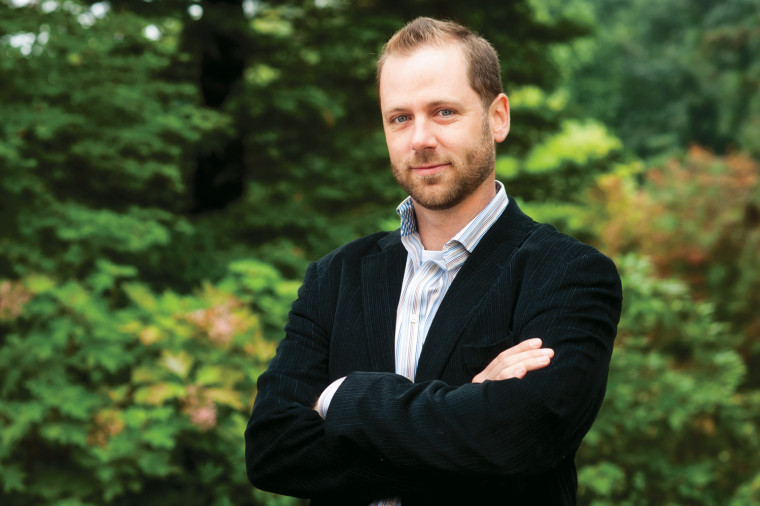Filmmaker, Media Scholar Wins Teaching Award
Open gallery

Bryan Sebok, associate professor of rhetoric and media studies, is the latest professor in a long line of Lewis & Clark faculty to have won the prestigious Arnold L. Graves and Lois S. Graves Award.
This award, administered biennially by Pomona College and the American Council of Learned Societies, recognizes younger faculty members for exceptional teaching in the humanities.
How do you plan to use the award’s prize money?
I’ll do research into the connection between documentary style and cultural authority. There’s something interesting going on in terms of how people expect documentaries to have a privileged connection to fact, and how repeatedly and insistently that relationship has been undercut over time. I want to trace how we got into the present moment in terms of fake news, mockumentary, and the spread of pseudo-documentary across media.
How does your research focus impact your film work?
In my documentaries, I’m interested in how to get something more substantive out of documentary than just facts. One of my favorite filmmakers, Werner Herzog, says “If you’re purely after facts, please buy yourself the phone directory of Manhattan. It has four million times correct facts. But it doesn’t illuminate.” The idea that facts are boring is interesting.
What is your teaching philosophy?
Enthusiasm, experimentation, and collaboration. Those are the central themes that I always return to. I work with students in and out of the classroom but also train them to collaborate with each other. I like to take risks and try new things.
What have your students taught you?
I’ve found that it’s important to engage each student individually and not to think of them collectively. Teaching is about the individual student. Every student has the ability to express themselves in dynamic, complex, and nuanced ways, but they have all kinds of different forms of expression and abilities.
What do you find most rewarding about teaching?
Definitely the collaboration. I think it’s key to make students aware that everything in every field is about working together—particularly in the media arts. Nothing happens in isolation. It’s important for me to bring students into a collaborative space, to get them thinking about each other as collaborators, and to show them how to work together in the field.
—Interview by Samantha Pratt BA ’20
More L&C Magazine Stories
Lewis & Clark Magazine is located in McAfee on the Undergraduate Campus.
MSC: 19
email magazine@lclark.edu
voice 503-768-7970
fax 503-768-7969
The L&C Magazine staff welcomes letters and emails from readers about topics covered in the magazine. Correspondence must include your name and location and may be edited.
Lewis & Clark Magazine
Lewis & Clark
615 S. Palatine Hill Road MSC 19
Portland OR 97219

